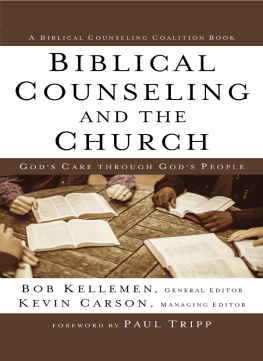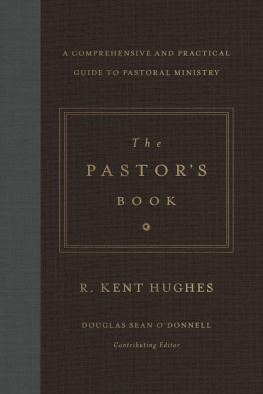Thank you for downloading this Crossway book.
Sign-up for the Crossway Newsletter for updates on special offers, new resources, and exciting global ministry initiatives:
Crossway Newsletter
Or, if you prefer, we would love to connect with you online:
Facebook
Twitter
Google +
A LSO BY K ENT AND B ARBARA H UGHES:
Disciplines of a Godly Family
Liberating Ministry from the Success Syndrome
Originally published by Tyndale House Publishers, Inc., 1987
Original copyright 1987 by Kent and Barbara Hughes
New edition, with new introduction, copyright 2008 by Kent and Barbara Hughes
Published by Crossway Books
a publishing ministry of Good News Publishers
1300 Crescent Street
Wheaton, Illinois 60187
All rights reserved. No part of this publication may be reproduced, stored in a retrieval system or transmitted in any form by any means, electronic, mechanical, photocopy, recording or otherwise, without the prior permission of the publisher, except as provided for by USA copyright law.
Cover design: Luke Daab
Cover photo: iStock
First printing, 2008
Printed in the United States of America
Scripture quotations are generally taken from The Holy Bible: New American Standard Bible , copyright 1960, 1962, 1963, 1971, 1973 by the Lockman Foundation.
Other Scripture quotations are from The Holy Bible: New International Version . Copyright 1973, 1978, 1984 by International Bible Society. Used by permission of Zondervan Publishing House. All rights reserved. The NIV and New International Version trademarks are registered in the United States Patent and Trademark Office by International Bible Society. Use of either trademark requires the permission of International Bible Society.
Library of Congress Cataloging-in-Publication Data
Hughes, R. Kent.
Liberating ministry from the success syndrome / Kent and Barbara Hughes.
p. cm.
Originally published: Tyndale House Publishers, c1987.
Includes bibliographical references.
ISBN 13: 978-1-58134-974-0 (tpb)
1. Pastoral theology. 2. Success. I. Hughes, Barbara. II. Title.
BV4011.3.H76 2008
2007037657
253dc22
CH 17 16 15 14 13 12 11 10 09 08
14 13 12 11 10 9 8 7 6 5 4 3 2 1
CONTENTS
PART I
A D ARK N IGHT OF THE S OUL |
| 1 |
| 2 |
PART II
D EFINITIONS |
| 3 |
| 4 |
| 5 |
| 6 |
| 7 |
| 8 |
| 9 |
| 10 |
PART III
E NCOURAGEMENTS |
| 11 |
| 12 |
| 13 |
| 14 |
| 15 |
PART IV
H ELPS |
| 16 |
| 17 |
ONE
As I begin our story, do not suppose that this is the hardest thing that has happened to me in the ministry. It is not. The significance of my experience is not its hardness, but that it almost made me quit my divine calling.
When a man is forty-five he is said to be in mid-life, and I certainly am. It is also often said that he is in his prime, and that I am. I have been married twenty-five years to a woman who is not only my love but my soul partner. We have four children, all of whom love Christ and want to serve him in their callings.
Twenty-three of our twenty-five years have been spent in ministry. Preaching is my passion. Even on vacation, I enjoy books that have to do with the history of preaching and homiletic thought and theology. I feel as if I am doing the thing I was born for.
The ministry has made it possible for me to experience what some would (unwisely!) call success, as I have traveled widely, spoken to international conferences, written several books, and sat on the boards of Christian organizations.
Those who have served alongside me these past twenty-plus years say that they see me as a capable, solid, even-dispositioned pastor who has a positive approach to ministryand all of life. And without hesitation I can say that they are right. Though I am not unfamiliar with dark moods, such times are rare in my lifeand always have been.
All of this is what makes the following account so enlightening.
I was not feeling well as I stepped from the car onto my broiling southern California driveway and walked, briefcase in hand, toward the shade of the front porch. There Barbara cheerfully greeted me through the kitchen screen.
Aware of my gradual depression, she had been observing me with increasing concern. My gait had lost its characteristic energy and I often appeared downcast. Barbara knew that it had to do with my work, for she observed that when things were going well at church I was OK, but otherwise I was discouraged. If church attendance was up, I was up; if it was down, so was I. And the numbers had been going down for a long time.
What Barbara didn't know was that I was seriously wondering whether I should continue in the pastoral ministry. Neither was she aware that the doubts troubling me were actually so repugnant that I could not bring myself to verbalize them. Nor could she know that as I further suppressed them, my depression itself had become increasingly ugly.
A covert, unarticulated animosity had crept through my soul. It was hidden from all. Years of honestly cultivated Christian civility served me wellfor inside I was a very angry man.
The focus of my resentment was God himself, the one who had called me to this. I had given everythingall my time, all my education, years of ministry and true Christian devotion (he knew?)and now I was failing. God was to blame.
Beneath my pastoral veneer, dark thoughts moved at will.
Inside I was embarrassed and fearful. At night, as I drifted off to sleep, the beneficent faces of my well-wishers would slip in and out of focusalways smiling. They seemed benignly to watch me sink into a pit of miserable despair.
I wanted to quit.
How had I come to this? In retrospect, I can now see that much of it had to do with my expectations, which went back to the very week when as a twelve-year-old I meet Christ at summer camp....
I can still remember the growing lens of my flashlight illuminating the delicate pages of my tiny Bible. After lights out in the musty, gym-sock air of my sleeping bag, trembling with joy, I read and reread the great texts of salvation. I had come to know Christ!
Although I was not quite a teenager. I knew that I was called to preach. So sure was I that the next day I let everyone know. When I went home, I announced it to my family and gave testimony to it before the whole church. It was a precocious announcement, but it was of God. The call was never to leave me. It gave profound direction to my young life. God had saved me and called me, and in my youthful egocentricity, I assumed he was going to do great things through me.
Because of this my teenage years were full and focused. I wholeheartedly entered into the life of my local southern California high school and churchall the while happily growing in my pastor-to-be persona.
When just sixteen I preached my first sermon on Jonah and the Whale. I gave it a double title: The Chicken of the Sea, or God Has a Whale of a Plan for Your Life! So it was a sermon of dubious wit and doubtful quality! The mere doing of it established my identity as one called to the gospel ministry. Many kind and affirming people in my church predicted I would be a good preacher. And with their predictions, my anticipation of future success increased.
















